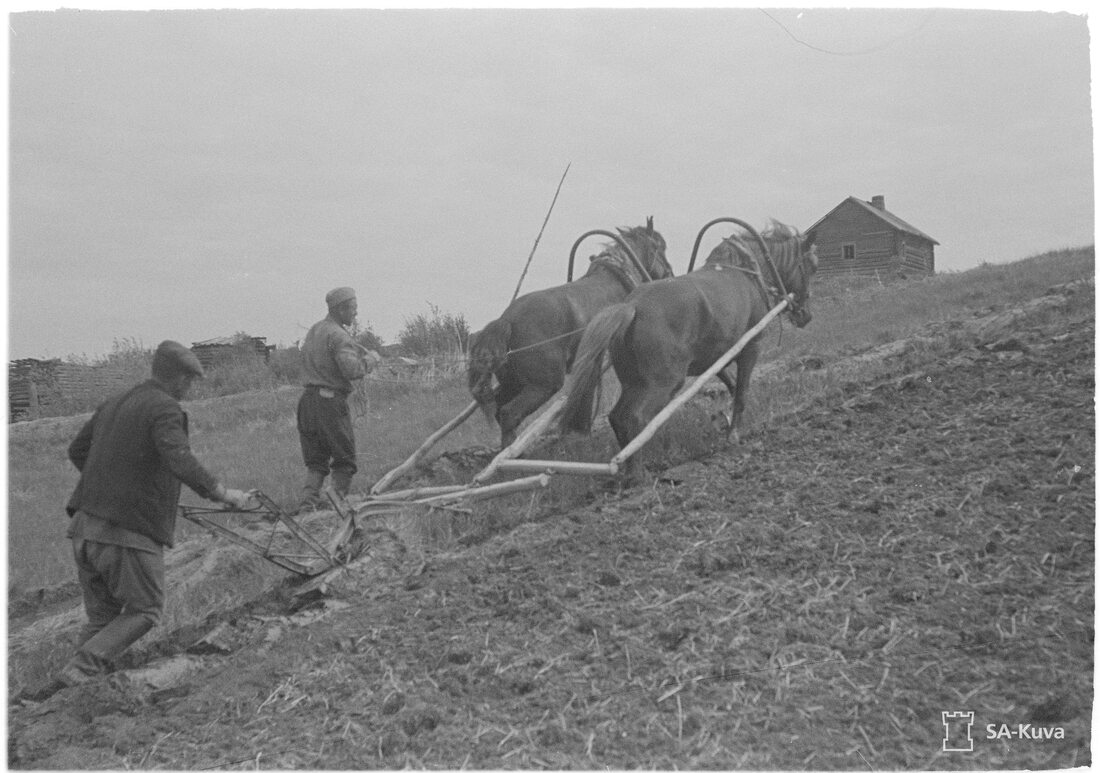|
Hugh asks: I can't understand the following sentences from "Pesäpallo, Iisakki vähäpuheinen"by Pentti Haanpää. Please can you help? 1. Automopiilillä ne ajaa löyhöttävät Kairanmaallakin, joskaan ei Jokiperällä, jossa ei ole tietä... 2. Jun valtion lähettämä mies, velho, lopulta nosti repun hartioilleen ja menu menojaan, niin vasta silloin jokiperäläisillä oli aikaa tehdä hammsia heinääkin. 3. Valtio sai talvella ostaa jokiperäläisille rehuja monen monituisen miljoonan edestä, ettei karjoille olisi käynyt aivan kolosti ja lehmänanti lakannut tiukkumasta. 4. Sillä hyvällä varalla yhtä vahingolliset ja päähänmenevät seuraukset siitä on... My answer: What a challenging bit of reading you've chosen! I don't understand all of it myself, but I'll give it a try! Advanced vocabulary ahead. 1. Automopiilillä ne ajaa löyhöttävät Kairanmaallakin, joskaan ei Jokiperällä, jossa ei ole tietä... Automopiili is an old word for car, and ajaa löyhöttävät is an expression that basically just means the same as 'ajaa', to drive. Kairamaa is a place name, and joskaan ei can be translated as 'albeit'. So in simpler Finnish, this could be: Autolla ne ajavat Kairanmaallakin. He eivät kuitenkaan aja Jokiperällä, jossa ei ole tietä... I won't even attempt an English translation that captures the tone of all the expressions well, here's a simple version: They also drive a car in Kairamaa, albeit not in Jokiperä, as there's no road there. 2. Jun valtion lähettämä mies, velho, lopulta nosti repun hartioilleen ja menu menojaan, niin vasta silloin jokiperäläisillä oli aikaa tehdä hammsia heinääkin. I don't know what Jun means, is it a place name? Or should it be something like kun? Jun valtion lähettämä mies The man sent by the state of Ju? Kun valtion lähettämä mies When the man sent by the state... velho this is everyone's favorite Duolingo word, it means 'wizard' lopulta nosti repun hartioilleen finally lifted the backpack on his shoulders ja menu menojaan There's a typo here, it should probably be ja meni menojaan mennä menojaan is an expression that basically means the same as mennä, to go. I'd translate meni menojaan as 'was on his way' niin vasta silloin... it was only then that... jokiperäläisillä oli aikaa tehdä hammsia heinääkin I don't know what hammsia means, I don't recall ever seeing such a word, and can't find it anywhere either. Perhaps it's from a dialect or made up by Haanpää? jokiperäläiset means more or less "the people from the end of the river", X:llä on aikaa means X has the time to do something, so the whole sentence would be tehdä heinää to make hay, so to harvest the hay that has grown in the field during the summer The people from the end of the river had time to also make hay hammsia looks like it might be an adjective in the partitive case, so it's a word that's describing the hay. 3. Valtio sai talvella ostaa jokiperäläisille rehuja monen monituisen miljoonan edestä, ettei karjoille olisi käynyt aivan kolosti ja lehmänanti lakannut tiukkumasta. monen monituisen miljoonan edestä = monella miljoonalla (markalla/eurolla/dollarilla) monen monituisen is an expression that means 'a lot of, several' Valtio sai talvella ostaa jokiperäläisille rehuja monen monituisen miljoonan edestä The state had to spend several millions to buy feed for the river enders ettei karjoille olisi käynyt aivan kolosti so that things wouldn't go too badly for the livestock käydä kolosti is an interesting expression that you don't hear very often. It means the same as käydä huonosti, 'to go badly' ja lehmänanti lakannut tiukkumasta. lehmänanti lehmä + anti, from the verb antaa 'milk' and so the milk would keep coming So the whole sentence means: Valtio sai talvella ostaa jokiperäläisille rehuja monen monituisen miljoonan edestä, ettei karjoille olisi käynyt aivan kolosti ja lehmänanti lakannut tiukkumasta. The state had to spend several millions to buy feed for the river enders so that things wouldn't go too badly for the livestock and so the milk would keep coming. 4. Sillä hyvällä varalla yhtä vahingolliset ja päähänmenevät seuraukset siitä on... This one is difficult to decipher without more context. Something has harm(vahingolliset) and intoxicating consequences (päähänmenevät seuraukset), and hyvällä varalla is an expression that means that there's lots to spare. "Ostin hyvällä varalla ruokaa" I bought lots of extra food. Sillä could be translated as therefore here. Sillä hyvällä varalla yhtä vahingolliset ja päähänmenevät seuraukset siitä on... Therefore, with lots to spare, the consequences are just as harmful and intoxicating. Maybe this one makes sense when you read a longer passage? Hope this was as helpful as it was fun to write! Peltotöitä, working in a field. Picture courtesy of Museovirasto.
Hugh Moules
6/9/2021 18:39:21
Thank you for answering my question about "Pesäpallo, Iisakki vähäpuheinen" by Pentti Haanpää. I apologise for my carelessness in making at least two typos and shall try to devote more attention to avoiding this. The excerpt appears in "Monikulttuurisen maamme kirja", a miscellany of the works of Finnish authors and poets. I am trying to gallop through it at speed (not a good idea, I know!) because I have two major works lined up for study: "Tessin tarina" and "Hurskas kuurjuus" along with the english versions for reference. I'm retired and spend most of my time this way (sad!), but the learning process seems to go on ad infinitum. I'm particularly weak on aural understanding, so no YKI for me, but I shall try the exercises in the link you helpfully provide. 7/9/2021 14:07:58
Thank you again for a great question, this was really interesting and fun to do! Comments are closed.
|
Archives
June 2024
|
Ask a Finnish Teacher / Toiminimi Mari NikonenBUSINESS ID (Y-Tunnus) 2930787-4 VAT NUMBER FI29307874 Kaupintie 11 B 00440 Helsinki If you'd like to send me something in the mail, please email me for my postal address. [email protected] +358 40 554 29 55 Tietosuojaseloste - Privacy policy |


 RSS Feed
RSS Feed